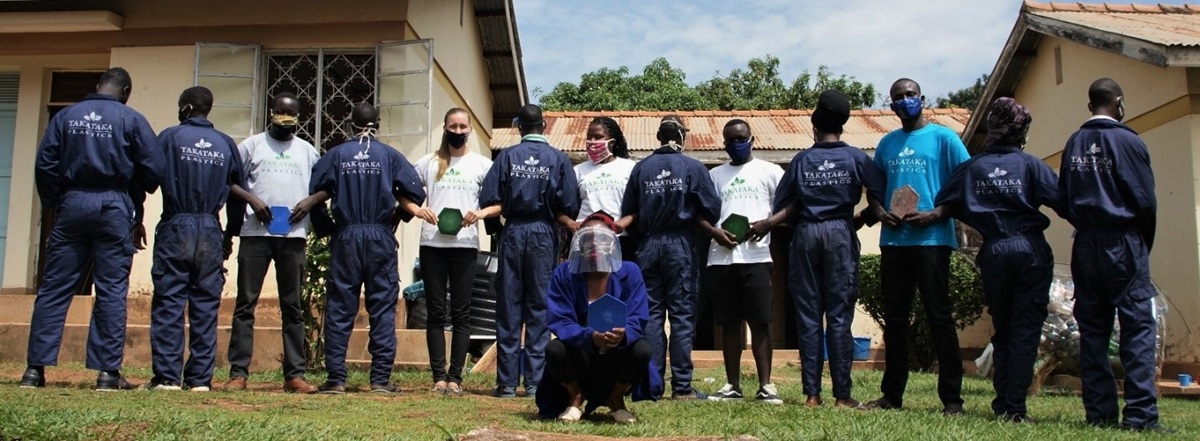
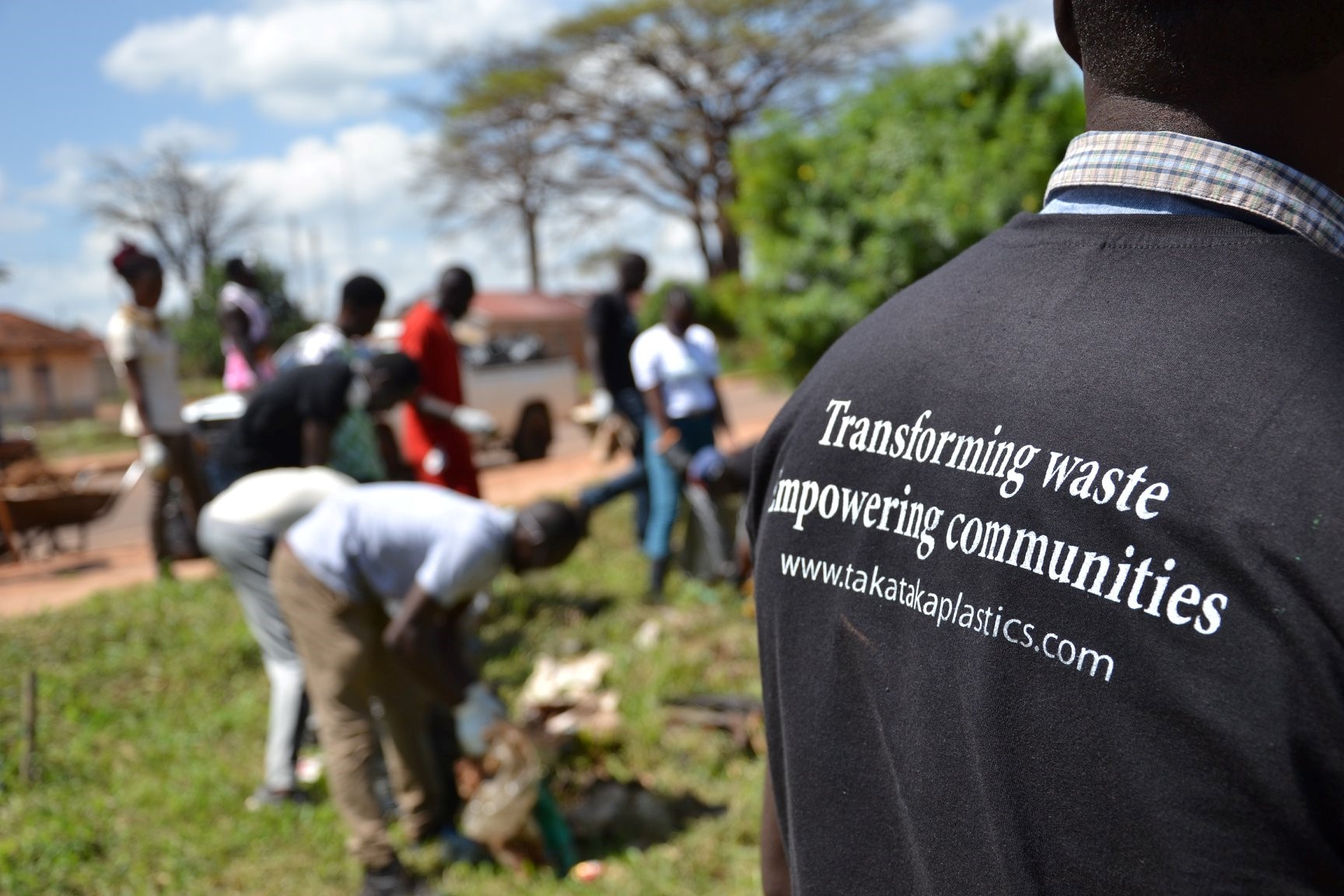
Takataka Impacts
Paige Balcom, Rodman C. Rockefeller Centennial Fellow 2020; Co-Founder & CTO of Takataka Plastics and PhD Student at UC Berkeley
“Takataka is a place to grow. It’s family. It’s hope.” – Staff Member
Ten months has brought more impact and progress than even I imagined for Takataka Plastics. We’ve created sixteen jobs (nine of them for former street youth), recycled over 1,000 kg of plastic waste into new products, educated more than 40,000 people about plastic waste and recycling, manufactured and distributed more than 10,000 face shields to frontline medical workers and teachers across Uganda (including to UVRI—Uganda Virus Research Institute—the country’s premier institution researching COVID-19). We proved that our engineering theories worked and successfully made wall tiles from PET plastic using our locally built machines. Currently water and soda bottles made from PET are one of the most ubiquitous forms of plastic waste, but they can’t be recycled anywhere in Uganda.
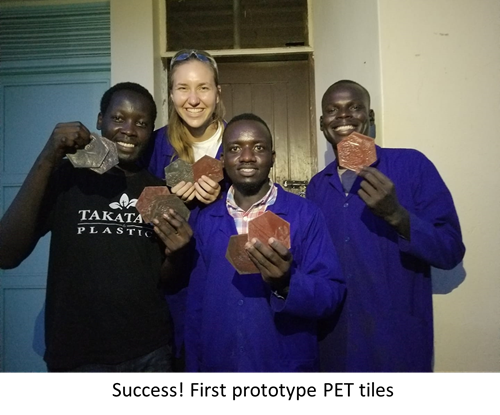
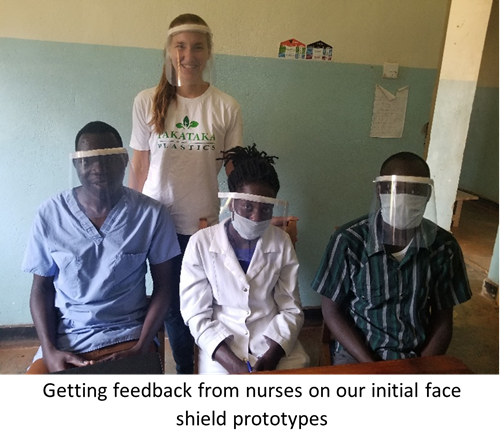
We spoke in schools and started monthly community cleanups as part of our “Make Gulu Green” campaign and saw people’s mindsets about waste start to change. Some community members no longer see plastic waste as ‘useless rubbish’ and working with it as a ‘dirty job’, but they are starting to see waste as a resource and the people working with it as innovators developing their city. 
Takataka Plastics supported three Gulu University engineering students as interns and trained ten other students with small projects. Despite COVID-19 and Uganda’s strict lockdown, we’ve expanded operations and served our community by producing reusable face shields from plastic waste. During the first months of the pandemic, Takataka Plastics also played a key role in a group of organizations and friends of Gulu who distributed more than 78 tons of food to over 25,000 of Gulu’s most vulnerable residents suffering from hunger because of the lockdown.
I think Takataka Plastics biggest impact has been on the lives of our staff. Steady jobs are very difficult to get in Uganda, especially for youth, and many people in Northern Uganda have experienced trauma as the area is still experiencing the after-effects of the 21 year war and atrocities carried out by Joseph Kony and his Lord’s Resistance Army. Gulu, where we work, has approximately 400 street youth who have been orphaned by war or fled abusive home situations. A job not only helps get the youth off the street, it gives them self-respect and the respect of the community; enables them to provide for themselves and their families; restores them to society; reunites families; and is an integral part in the trauma healing process. Through the Bible Society of Uganda, we’ve been able to offer all of our staff a 12-week trauma healing program, and the savings group we started at Takataka Plastics has enabled some of the former street youth to set up their own small side businesses. The impacts on their lives are best told by our staff themselves:
Staff Member: “Working at Takataka has helped me a lot. A lot. Now I can provide all my basic needs for myself—rent, food instead of asking from family or waiting for short gigs here and there…now I have steady flow of income and can pay rent and provide for myself.”
Engineer: “Working at Takataka has impacted my life a great deal…working at Takataka has definitely allowed me to provide for myself and my family…My favorite part of working at Takataka is research. Getting to know things that I didn’t know. I’m really thankful for the opportunity to work in my field.”
Manager: “My favorite part of working at Takataka is the philanthropic part—the community cleanups, reaching out and telling people about plastic waste and caring for the environment. We’re not doing this for money, we’re doing it for our future. We were able to do good work and people joined in, they helped us. After a long day, when someone says to you a simple ‘apwoyo’ [thank you], it’s enough. It feels good…I’ve even been to the referral hospital [main hospital in Gulu] wearing my Takataka shirt, and the nurses, the staff there say to me, ‘Takataka. You’re the ones who gave us the face shields. Thank you.’” Engineer: My favorite part of working at Takataka is “being able to work from First Principles. I used to do a lot of ‘firefighting’ or ‘fixing what’s broken’, but at Takataka I really like that I get to design something properly from the beginning. It’s what I pictured engineering would be.”
Our employees who are former street youth really showed the wide-ranging impact not just on themselves, but their entire families and futures as shown by the following quotes:
“I see a lot of changes in my life. My life used to be so hard before joining Takataka Plastics. Unlike in the past, it is now easy for me to get money…I support my family but mostly my friends. They help me when I am in trouble and I do the same too.”
“I find a lot of changes in my life. Right now, I am in position to support the woman who used to take care of me prior to getting my job. I work hard to make sure that she lives a good life.” “When I [walk] on the streets, most people tell me that I look much better these days…When I go home, I carry along something for my family. This is all because I am doing something with Takataka Plastics. I lost both my parents. However, my father’s relatives are in Gulu. Whenever I visit them, I support them.”
“Ever since I started working, I find my life much better. I have my siblings in the village. Whenever they are sick, I am in position to send them support. My mum is no more. I also support my aunt. People in my community always tell me that my life has changed.”
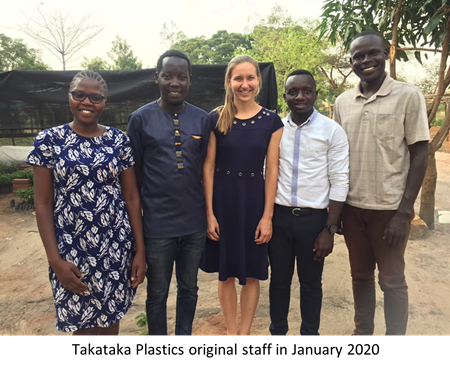
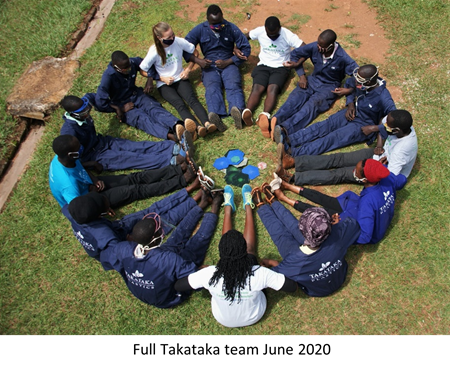
Personally, it has been such a joy to watch Takataka Plastics carry out its motto of “Transforming waste, empowering communities.” I’ve learned and grown a lot from starting a business in Uganda. The challenges are many, but I look forward to coming to office every morning—our Takataka office is always buzzing with life and new ideas. I love working with our engineers to design experiments and new machines, discussing sales strategy with our sales manager, going over logistics with our administrator, and chatting with the youth on our production team. I’ve learned much from my Ugandan colleagues, and I’m always amazed at their ingenuity. Whenever the difficulties seem too big, I draw strength from them—my Takataka family—and think of a comment one of the security guards at our office made. He said, “You can’t even tell they [Takataka youths] used to be street kids.” Seeing lives changed is my motivation to keep pushing Takataka Plastics forward.
The IIE Centennial Fellowship was key in helping launch Takataka Plastics; the support helped us realize our vision of transforming waste and transforming lives in Gulu. Now, we’re extremely grateful that we’ve recently received a 3-year grant from another foundation to carry on and expand Takataka Plastic’s impact.
